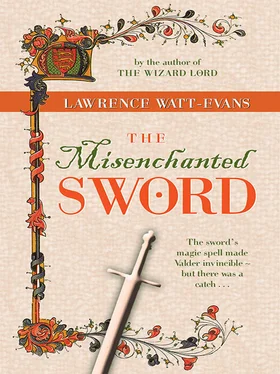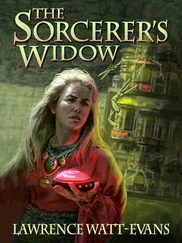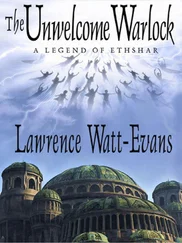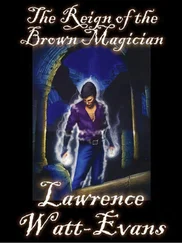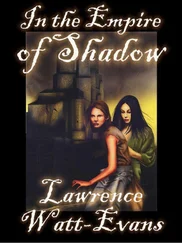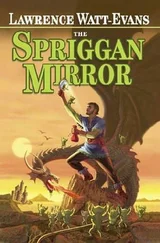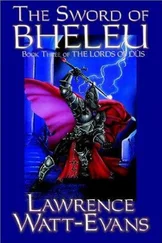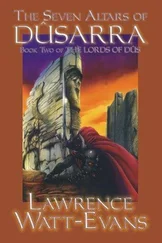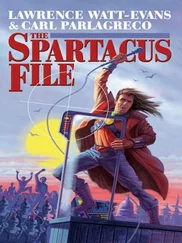Lawrence Watt-Evans - The Misenchanted Sword
Здесь есть возможность читать онлайн «Lawrence Watt-Evans - The Misenchanted Sword» весь текст электронной книги совершенно бесплатно (целиком полную версию без сокращений). В некоторых случаях можно слушать аудио, скачать через торрент в формате fb2 и присутствует краткое содержание. Жанр: Фэнтези, Юмористическая фантастика, на английском языке. Описание произведения, (предисловие) а так же отзывы посетителей доступны на портале библиотеки ЛибКат.
- Название:The Misenchanted Sword
- Автор:
- Жанр:
- Год:неизвестен
- ISBN:нет данных
- Рейтинг книги:4 / 5. Голосов: 1
-
Избранное:Добавить в избранное
- Отзывы:
-
Ваша оценка:
- 80
- 1
- 2
- 3
- 4
- 5
The Misenchanted Sword: краткое содержание, описание и аннотация
Предлагаем к чтению аннотацию, описание, краткое содержание или предисловие (зависит от того, что написал сам автор книги «The Misenchanted Sword»). Если вы не нашли необходимую информацию о книге — напишите в комментариях, мы постараемся отыскать её.
The Misenchanted Sword — читать онлайн бесплатно полную книгу (весь текст) целиком
Ниже представлен текст книги, разбитый по страницам. Система сохранения места последней прочитанной страницы, позволяет с удобством читать онлайн бесплатно книгу «The Misenchanted Sword», без необходимости каждый раз заново искать на чём Вы остановились. Поставьте закладку, и сможете в любой момент перейти на страницу, на которой закончили чтение.
Интервал:
Закладка:
“My question is this: What are all the possible ways in which I might be freed of the enchantment linking me to the sword Wirikidor?”
Lurenna smiled. “That’s a much better question; it may take some time, however. Would you prefer to return tomorrow?”
“I’ll wait,” Valder replied.
“As you wish,” she said, as she rose and again vanished behind the drapery.
The wait this time seemed even longer than before—and in truth, it was longer than before. Unable to sit still, Valder at last rose and went to the door, only to discover that outside the street was dark and empty, the torches doused or burnt out, the shops shuttered tightly and their lamps extinguished, the people gone to their homes. The sky was clouded with the city’s smoke, so that he could not judge the hour from the stars, but Valder guessed it to be midnight or later. He had, he remembered, arrived at this shop shortly after full dark; whatever spells Lurenna might be working, they obviously took time.
There was nothing to see on the deserted street; he returned to his chair and waited.
He had dozed off before Lurenna returned; he awoke with a start to find her staring at him, a sheet of parchment in her hand.
He stared back for a moment, then said, “Well?”
“No, I’m afraid it is not well at all.” She held up the parchment. “I had to ask a second question, for which I will not charge you. The answer to your original question was very brief, very simple; you may only be free of Wirikidor with your death. No other possibility exists anywhere that wizardry holds sway—and wizardry, of course, holds everywhere. My second question, then, was by what means might you die—I promised you a complete answer, after all, and you paid me on that basis. There are only two ways in which you can die; I was surprised, I will admit, to find that out, since most men may die in any number of ways. You, however, may be slain only by another’s hand drawing and wielding Wirikidor, or by a magical spell powerful enough to break the enchantment, thereby killing you, destroying the sword, and slaying the spell’s wielder in an explosive release of the arcane forces pent in the sword. The wizard who cast the original spell, whether intentionally or not, booby-trapped it quite effectively.”
Valder continued to stare at the wizard for a long moment. “You’re certain?”
“Absolutely. I’ll swear it by any terms you might choose.”
“You said that I might be slain only by another’s hand; can I not kill myself?”
“No; the sword must be drawn and wielded by another—and a man, at that.”
“But no one else can draw the sword!”
“Not until you have slain another nineteen men.”
“Nineteen? Exactly?”
“Could be eighteen, could be twenty, but it’s probably nineteen.”
“Darrend wasn’t that exact.”
“Darrend analyzed the sword a long time ago, without the spells I know, and when the spell was fresher and more chaotic.”
“I’m sixty-six years old; how am I going to kill nineteen men?”
“One at a time,” Lurenna replied with a shrug.
“There is no other way out?”
“None known to wizardry.
“Damn wizardry!” Valder said, as he turned and headed for the door.
He had forgotten, in his anger, how late it was; he looked at the empty streets in annoyance, then headed back toward Westgate, looking for an inn. He knew that he was nearer to others of the city’s gates, but preferred not to wander randomly in search of them.
As he walked his anger cooled, and as his anger cooled he thought over possible courses of action.
He could, of course, let things remain as they were, and sink gradually into senility and decay that would last for as long as wizardry remained effective—forever, in short.
Or he could find one of the eighty or ninety high-level wizards capable of undoing the spell, and perhaps convince him to make the attempt, thereby condemning himself and the innocent wizard, and probably others, to a messy death. That assumed, of course, that one of those eighty or ninety wizards would be foolish enough to make the attempt, which seemed unlikely; surely they would be able to do their own divinations, and would see the danger. The possibility that one of that group might be suicidal was too slim to bother pursuing.
That left dying on Wirikidor’s blade as the only way out, unappealing as it was, and according to the wizards he could not kill himself, but must use up his ownership of the weapon and then wait to be murdered. He resolved to test that theory—but not immediately. He did not feel quite ready to die yet. Besides, if he drew the sword and the wizards were right, someone else would have to die, and he had no good candidates.
If the wizards were right—and he believed that they were—he would have to kill nineteen more men, give or take a few. In peacetime that was not going to be easy.
He could, of course, do what he had been asked to do so often and go join one of the warring armies in the Small Kingdoms—but wars could cripple and maim as well as kill. Besides, old as he was, and with poor eyesight, what army would want him, magic sword or not? And he did not care to kill people just because they were fighting a war; he would want to be on the side that deserved his help, and he had no idea how to go about choosing the morally superior side in a petty border war where the truth about the causes of the conflict would be almost impossible to get at.
There must, he told himself, be some way of finding people who deserved to die, and killing them.
That was an executioner’s job, of course, killing convicted criminals—once before he had slain a prisoner with Wirikidor, and although he had found it repulsive, he could think of nothing better. He resolved that, come morning, he would go to the Palace and apply for a job as an executioner.
He reached this decision somewhere in the Old Merchants’ Quarter, but was distracted temporarily by the necessity of finding an inn still open for business at this late hour. By the time he found a rather dirty and unappealing one a few blocks from Westgate, its sign weathered blank but shaped in a rough approximation of a gull, he had so thoroughly accepted the idea of becoming a headsman that he was wondering about such trivia as how much the job paid, and what the perquisites accompanying the post might be.
Chapter Twenty-Eight
He awoke late the next morning with innumerable itches and the unclean feeling that comes from sleeping in a bed already inhabited by a great many assorted vermin; as he alternately scratched and pulled on his clothes he thought over the events of the night before.
He had been exhausted, he realized—perhaps so much so that he had been too tired to realize just how tired he was. Still, in reviewing what he had said and done he could find nothing he would have done very differently had he been more alert. His questions to Lurenna might perhaps have been better used, and he wondered whether he might have talked down the price, but what had been done was done, and he had the answers he needed. Although his outlook on the world was somewhat different now that he had slept and been eaten by bedbugs, and would presumably change somewhat more when he had himself eaten, he had no doubt of the wizard’s veracity. She had been recommended by Tagger, after all, who Valder had trusted because he had not claimed to be able to do more than he could. For that matter, were Lurenna less than she claimed, she would most likely have given him more encouraging answers, and would not have stretched his three questions to the five she had actually answered.
That meant that there was no easy way out of his situation; he would have to kill nineteen men before he himself could be murdered, and the only way he could see to do that without the slaughtering of innocents or undue hardship for himself was to become an executioner.
Читать дальшеИнтервал:
Закладка:
Похожие книги на «The Misenchanted Sword»
Представляем Вашему вниманию похожие книги на «The Misenchanted Sword» списком для выбора. Мы отобрали схожую по названию и смыслу литературу в надежде предоставить читателям больше вариантов отыскать новые, интересные, ещё непрочитанные произведения.
Обсуждение, отзывы о книге «The Misenchanted Sword» и просто собственные мнения читателей. Оставьте ваши комментарии, напишите, что Вы думаете о произведении, его смысле или главных героях. Укажите что конкретно понравилось, а что нет, и почему Вы так считаете.
